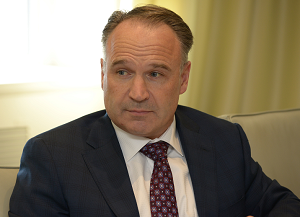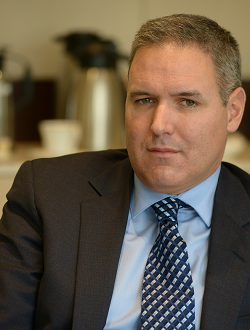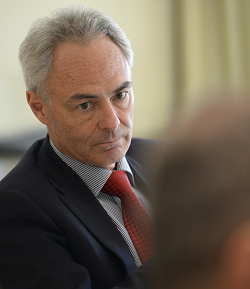Editor's note: In today's second installment of coverage of our U.S. equity roundtable, the managers emphasize the importance of being selective in the surging technology sector, where lofty stock prices aren't necessarily matched by profitability.
Our panelists:
Glenn Fortin, vice-president at Beutel Goodman & Co. Ltd. A specialist in U.S. equities, Fortin is a member of the firm's U.S. and global equity team. Its mandates include Beutel Goodman American Equity.
David Pearl, executive vice-president and co-chief investment officer at New York-based Epoch Investment Partners, Inc., which manages assets for TD Asset Management Inc. and CI Investments Inc. Funds managed include Epoch U.S. Large-Cap Value under the TD banner, and CI American Value.
Jonathan Norwood, senior vice-president and portfolio manager on the Mackenzie Cundill team at Mackenzie Investments. His mandates include Mackenzie Cundill U.S. Class.
Jim Young, vice-president at Invesco Canada Ltd. He is responsible for Trimark U.S. Companies and Trimark U.S. Companies Class.
This week's coverage of the roundtable, which was convened and moderated by Sonita Horvitch, began on Monday and concludes on Friday.
Q: Jim and David, you both have substantial weightings in technology. For Glenn, tech is a fairly significant weight and for Jonathan it is a major underweight position. This is in the context of your specific investment styles. We should briefly discuss your disciplines and your process before completing our discussion on the tech sector.
Norwood: I am a deep-value manager. We buy stocks that no one else likes. The stocks usually trade at a 50% to 60% discount to what we think they are worth. We have our own screens based on valuations and an army of analysts on the sell side who know what we look for. When a stock is completely crushed, we start to lift the hood and take a look at the company. We have less than 30 names in Mackenzie Cundill U.S. Class.
Fortin: We are bottom-up value-based investors, with a heavy emphasis on cash-flow generation. We like great franchises and have a longer-term investment horizon. Beutel Goodman American Equity has 26 names. When a stock reaches our target price, we automatically sell one-third of our position and then review the company. To initiate a position, we require at least a 50% total return over a three-year horizon.
 |
|
 |
|
| Glenn Fortin | |
 |
|
 |
|
 |
Pearl: Epoch's approach is fairly similar to Glenn's. We believe that value creation for shareholders is a result of free-cash-flow generation. We look for companies that have a sustainable competitive advantage, as they are more likely to be able to continually grow free cash flow over time. Then it is important to us that these companies allocate the cash correctly. We are value managers. We focus on stock price to cash flow or a cash-flow yield. We try to find businesses that are mispriced. Epoch U.S. Large-Cap Value, which we are referencing, has about 65 names.
Young: We focus on sustainable growth, what could be called a GARP approach, growth at a reasonable price. We look for companies that reinvest, particularly around innovation, in their businesses. We have owned a lot of companies for a long time and will stay invested in them, provided that they continue their trajectory and do not get overvalued. Trimark U.S. Companies has about 40 names.
Q: Glenn, as a value manager, how do you view and invest in the U.S. tech sector?
Fortin: We like those tech business models that have enterprise-related software and a sustainable business model. We own ![]() Oracle Corp. (ORCL). Another significant tech holding in the portfolio is
Oracle Corp. (ORCL). Another significant tech holding in the portfolio is ![]() Amdocs Ltd. (DOX). It is underfollowed and unloved. It is a major software and services provider to the telecom industry. It is firmly entrenched in its customers' businesses. It is a good generator of free cash flow and returns that free cash flow to shareholders.
Amdocs Ltd. (DOX). It is underfollowed and unloved. It is a major software and services provider to the telecom industry. It is firmly entrenched in its customers' businesses. It is a good generator of free cash flow and returns that free cash flow to shareholders.
 |
|
 |
|
| David Pearl | |
 |
|
 |
|
 |
The momentum in the U.S. tech sector comes and goes. Currently, the momentum in some individual stocks is at one of the highest levels that we have seen since the '90s, the time of the tech bubble and subsequent bust. Names like ![]() Amazon.com Inc. (AMZN) are pricey. On the flip side, there are stocks of traditional old-school tech corporations that are getting pummelled. Technology is affecting other sectors. For example, it is changing consumer-shopping habits. There is disruption under way in some bricks-and-mortar retailing.
Amazon.com Inc. (AMZN) are pricey. On the flip side, there are stocks of traditional old-school tech corporations that are getting pummelled. Technology is affecting other sectors. For example, it is changing consumer-shopping habits. There is disruption under way in some bricks-and-mortar retailing.
Pearl: It is easy to disrupt if you do not have to make money.
Fortin: That is where I draw the parallel back to the '90s, when anything with the word dot.com in its name was the stock to buy, regardless of its business model.
Pearl: The question is whether Amazon can ever make money? ![]() Facebook Inc. (FB) is a well-run, profitable business. The question is how high is high?
Facebook Inc. (FB) is a well-run, profitable business. The question is how high is high?
Norwood: Amazon makes money in Cloud services, but not anywhere else. Interestingly, Amazon founder and CEO Jeff Bezos recently sold US$1.1 billion of Amazon stock. Few of these high-profile tech-company insiders are buying their own stock. There is nothing but sells.
 |
|
 |
|
| Jonathan Norwood | |
 |
|
 |
|
 |
Technology is usually not fertile ground for deep-value managers like ourselves. We also own Oracle. A major tech holding is ![]() International Business Machines Corp. (IBM). We have been in the stock for a year. Warren Buffett has been selling down his holdings in this stock. We think the stock is at a trough in its price/earnings multiple and that IBM earnings have troughed. The company is transitioning away from its legacy businesses to higher-growth businesses. This will start to have an impact on its overall revenue. It is enterprise-focused.
International Business Machines Corp. (IBM). We have been in the stock for a year. Warren Buffett has been selling down his holdings in this stock. We think the stock is at a trough in its price/earnings multiple and that IBM earnings have troughed. The company is transitioning away from its legacy businesses to higher-growth businesses. This will start to have an impact on its overall revenue. It is enterprise-focused.
Pearl: On the outlook for tech stocks, business capital spending has started to go up, finally.
Norwood: Half of business capital spending is on information technology.
Fortin: A lot of these enterprise players are consolidators. The technology companies generally are among the best cash-flow generators in corporate America.
Young: U.S. technology should continue to do well. We pointed to a few examples of overenthusiasm in terms of valuation. But there are still lots of opportunities. You have to pick your spots.
Q: Time now to talk about the health-care sector, which represented 14.1% of the S&P 500 Index at the end of October and produced a total return of 19.4% for the first 10 months of 2017.
 |
|
 |
|
| Jim Young | |
 |
|
 |
|
 |
Young: The biggest health-care holding in Trimark U.S. Companies on the products side is ![]() Celgene Corp. (CELG), a biotech company.
Celgene Corp. (CELG), a biotech company. ![]() Stryker Corp. (SYK) is the biggest holding on the medical devices and medical equipment side.
Stryker Corp. (SYK) is the biggest holding on the medical devices and medical equipment side.
Pearl: Health care has gone from being one of the least volatile sectors of the market to one of the most volatile. This is because of regulation and government issues. Then there is the normal risk of product cycles and patent expirations. The impact of Amazon's strategy is now being felt in health care. There is not one macro theme in this sector. It is a stock-by-stock assessment.
Young: I focus on the product side and the science is progressing rapidly. It is complex. It is difficult to develop new products, but it is highly rewarding when a company is successful. These companies have to constantly reinvest because patent lives are limited. Celgene had one product that did not make it and another product where the sales slowed down, so investors took the stock's multiple down. The company is still growing its revenue at more than 20% per annum. It has a broad pipeline of products. The stock trades at a mid-teen multiple. Stryker is a leader in orthopedic devices and offers many other products, such as endoscopic cameras. It is diversified and fast growing. I still have a good weight in ![]() Johnson & Johnson (JNJ). A smaller company in the fund is
Johnson & Johnson (JNJ). A smaller company in the fund is ![]() Nektar Therapeutics Inc. (NKTR). It has interesting products, particularly in the field of immuno-oncology.
Nektar Therapeutics Inc. (NKTR). It has interesting products, particularly in the field of immuno-oncology.
Pearl: We own ![]() UnitedHealth Group Inc. (UNH), a health-care services company. The stock has done well. It is taking advantage of the complexity of U.S. health care. It is the largest private health-care insurer in the United States. An unregulated part of its business provides services to hospitals and other health-care providers in such areas as patient monitoring, billing and computer systems. There is a lot of growth in its businesses. We also own a smaller company,
UnitedHealth Group Inc. (UNH), a health-care services company. The stock has done well. It is taking advantage of the complexity of U.S. health care. It is the largest private health-care insurer in the United States. An unregulated part of its business provides services to hospitals and other health-care providers in such areas as patient monitoring, billing and computer systems. There is a lot of growth in its businesses. We also own a smaller company, ![]() Centene Corp. (CNC). It is the largest Medicaid insurer in the United States. We also own drug companies, such as
Centene Corp. (CNC). It is the largest Medicaid insurer in the United States. We also own drug companies, such as ![]() AbbVie Inc. (ABBV). The stock did well this year. AbbVie has a major drug, Humira, which treats rheumatoid arthritis. The stock had a low valuation on concerns about this drug going off patent. But this year, the company won its patent challenges and Humira's patent term has been substantially extended. The company is a strong cash-flow generator and is very profitable. It has a good new-drug pipeline. The stock is inexpensive.
AbbVie Inc. (ABBV). The stock did well this year. AbbVie has a major drug, Humira, which treats rheumatoid arthritis. The stock had a low valuation on concerns about this drug going off patent. But this year, the company won its patent challenges and Humira's patent term has been substantially extended. The company is a strong cash-flow generator and is very profitable. It has a good new-drug pipeline. The stock is inexpensive.
| AbbVie Inc. | Celgene Corp. | Stryker Corp. | |
 |
|||
| Nov. 20 close | $93.60 | $103.15 | $154.75 |
 |
|||
| 52-week high/low | $98.26-$58.60 | $147.17-$94.55 | $160.62-$108.29 |
 |
|||
| Market cap | $151.6 billion | $82.9 billion | $58.2 billion |
 |
|||
| Total % return 1Y* | 58.9 | -15.4 | 40.4 |
 |
|||
| Total % return 3Y* | 15.5 | -1.3 | 21.1 |
 |
|||
| Total % return 5Y* | - | 21.8 | 24.7 |
 |
|||
 |
|||
| *As of Nov. 20, 2017. All figures in U.S. dollars Source: Morningstar |
|||
Photos: Paul Lawrence Photography


















